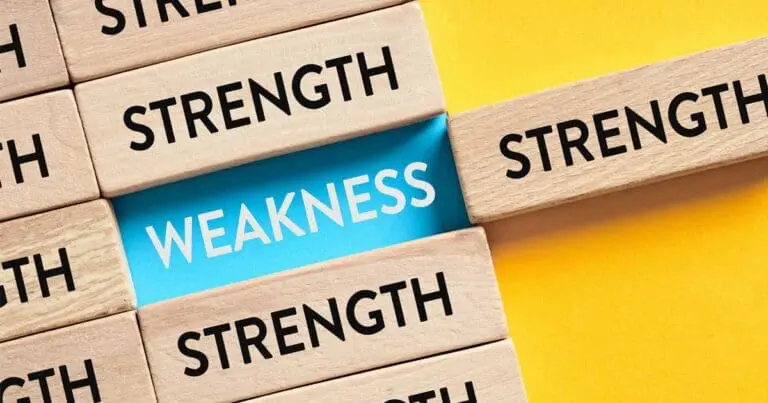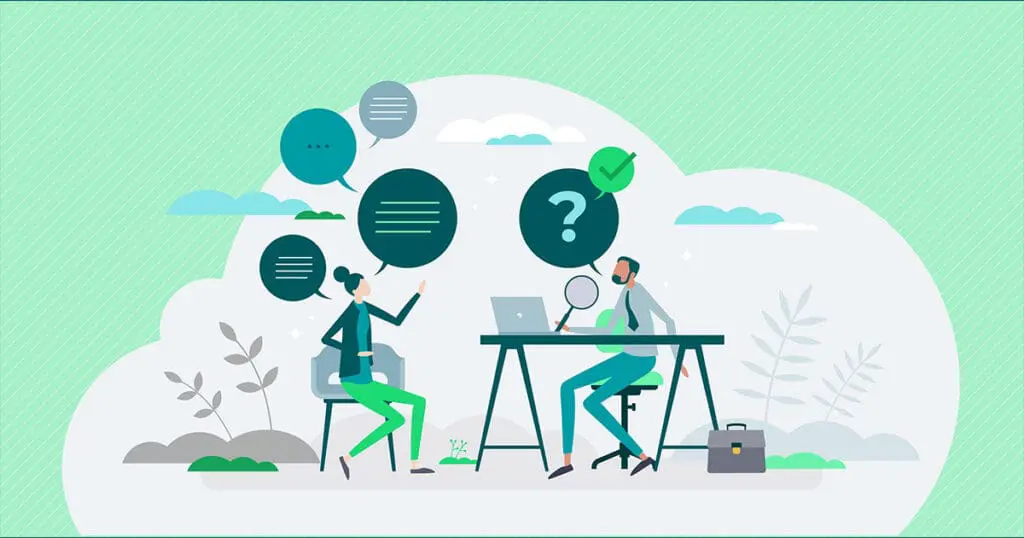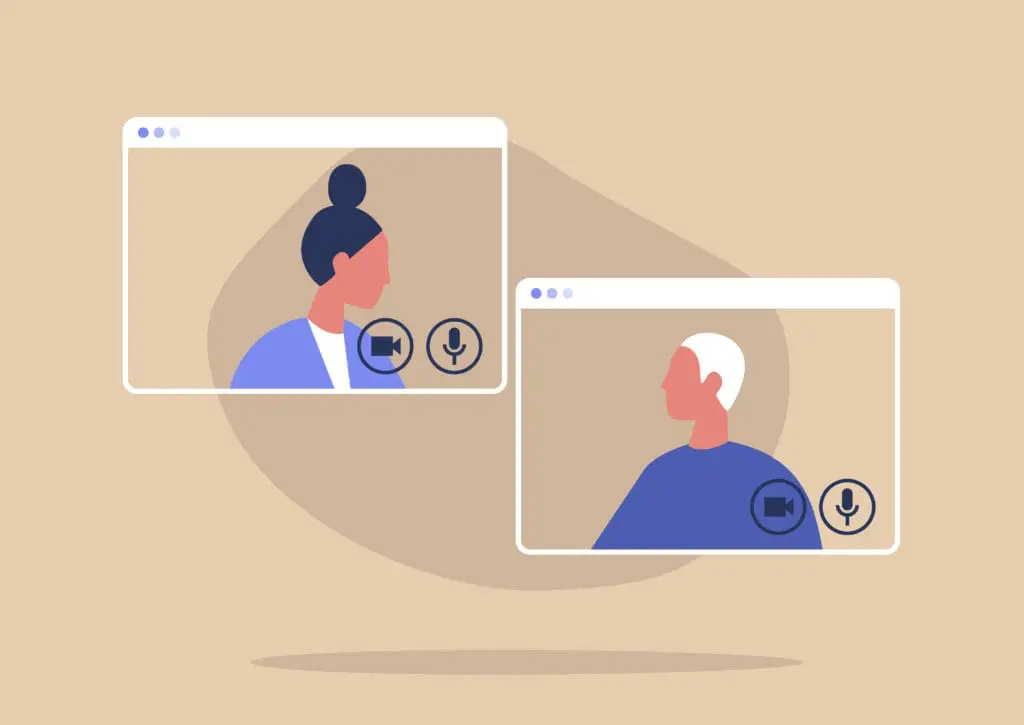How to Answer “What Is Your Biggest Weakness?” with Example Answers

When interviewing for a job, one of the questions you’ll inevitably be asked is, “What’s your biggest weakness?”
This can seem like a difficult question to answer because you don’t want to come across as negative or unprepared.
The good news is that there are ways to answer this question effectively and things to keep in mind when answering so that you can approach this question with confidence.
Everything you need to know about answering, “What’s your biggest weakness?”
- How to talk about your weaknesses in an interview
- Sample answers for “What’s your biggest weakness?
- 11 examples of common weaknesses
- Why do employers ask about your weaknesses in an interview?
- VIDEO: What are your weaknesses? – Sample answer
- Answer template for “What are your weaknesses?”
How to talk about your weaknesses in an interview
How to talk about your weaknesses in an interview depends on your ability to be authentic, acknowledge opportunities for growth, and more.
Be authentic
When talking about your weaknesses in an interview it’s important to give an honest answer and choose a real weakness you truly believe you have.
Interviewers will know if you’re choosing a weakness just for the sake of getting through the interview.
The goal is to demonstrate to hiring managers that you are self-aware, open to improvement, and transparent about your genuine weakness.
Don’t disguise a strength as a weakness
Trying to disguise a strength as a real weakness is one of the oldest tricks in the book and will be seen as a cop-out answer to the question.
Examples of this would be saying that you “work too hard” or that you “care too much.”
Acknowledge the opportunity for growth
Use this as an opportunity to show that you’re aware of your weaknesses and that you’re taking steps to improve.
This will demonstrate to the hiring manager that you have a growth mindset and are looking for ways to continuously improve.
List steps you’ve taken to improve
When discussing your weaknesses it’s always best to come prepared with examples.
Examples of steps you’ve taken to improve could include:
- I’ve been working with a coach to improve my communication skills.
- I’ve taken a class on time management to help me learn how to better prioritize my time.
- I’ve started reading books on [insert topic] to learn more about the subject.
Keep it brief
When discussing your weaknesses, you don’t want to spend the entire interview talking about the ways you need to improve in order to be effective in your role.
The goal is to provide a few examples of things you’re working on and then move on to talking about your strengths.
Sample responses for “What is your biggest weakness?”
Answer for “trouble setting boundaries” as a weakness
“One of my weaknesses is that I have trouble saying no to people. I’m a people pleaser and I want everyone to be happy, so sometimes I’ll agree to things even if I’m already stretched too thin.
I’ve been working on setting boundaries and learning how to say no in a way that doesn’t make people feel upset which has improved my ability to stay committed to my core responsibilities.”
Answer for “getting hung up on small details” as a weakness
“I sometimes get too caught up in the finer details of a project. This can keep me from seeing the bigger picture and can hold me back from completing tasks on time.
It’s something I’m working on by making a conscious effort to take a step back and focus on the goals of the project.
This has resulted in being more aware of the bigger picture and getting less bogged down in the details.”
Answer for “trouble delegating” as a weakness
“When I become passionate about a project, I have a hard time delegating and letting go. I want to be in control and make sure everything is done perfectly.
I’ve been working on this by communicating my vision for the project to others and working on building mutual trust within my teams.
This has resulted in beginning to feel more confident delegating tasks and letting teammates work within their areas of strength.”
Answer for “disconnecting from work” as a weakness
“In the past, I’ve had trouble disconnecting from work which has led to burnout and resentment.
I’ve learned that if I’m burnt out, I can’t work to my full potential or be an effective team member if I’m working from a place of resentment.
I’m working on this by setting boundaries with my work and making sure to take time for myself outside of the office.
This has included things like scheduling breaks throughout the day, taking vacation days, and saying no to additional projects when I’m already feeling overwhelmed.”
Answer for “trouble asking for help” as a weakness
“I sometimes feel that asking for help makes me look weak or like can’t handle the job.
I’ve since realized that everyone needs help from time to time and that it’s okay to ask for assistance when needed.
To work on this I’ve practiced asking for help in non-work settings and this has resulted in becoming more comfortable with asking for help at work when I need it.”

11 examples of common weaknesses
Responses to the question, “What’s your biggest weakness,” should include self-awareness and acknowledgments of challenges like having trouble asking for help, expecting too much of others, and more.
- Getting too caught up in the finer details
- Saying no and setting boundaries
- Delegating and letting go of projects
- Trouble disconnecting from work
- Public speaking skills
- Expecting too much of others
- Not always confident enough / lacking self-confidence
- Expressing praise and recognition
- Over-scheduling / not allowing time for creativity
- Trouble asking for help
- Working with ambiguity
1. Getting too caught up in the finer details
This shows interviewers that you’re a perfectionist and that you have high standards for your work.
It also shows that you’re working on how to recognize when you might be getting too caught up in the details and that you’re open to learning how to adjust accordingly.
2. Saying no and setting boundaries
In some workplaces, saying no can be seen as a weakness so setting boundaries can be a challenge.
However, you can use this opportunity to show that you acknowledge that this is an opportunity for improvement and that you’d like to work toward managing your time and priorities effectively.
3. Delegating and letting go of projects
If you’re someone who likes to have control over everything, it can be difficult to delegate projects or let go of them entirely.
By admitting this as your biggest weakness, you’re showing that you understand that it’s important to delegate in order to be an effective leader.
You’re also indicating that you’re willing to work on letting go of projects and trusting others to handle them when appropriate.
4. Trouble disconnecting from work
If you’re passionate about your work, it can be hard to disconnect from it and take a break.
This is another opportunity to show that you understand the importance of setting boundaries between work and personal time.
You can mention that you’re actively working on ways to better disconnect from work when you’re not at the office.
5. Public speaking skills
For some, public speaking can be a source of anxiety that can lead to trouble leading meetings and presentations.
If this is something you struggle with, you can use this as an opportunity to show that you’re aware of your weakness and that you’re taking steps to improve.
For example, you might mention that you’ve taken a public speaking class or joined a Toastmasters group.
6. Expecting too much of others
If you tend to have high expectations of those around you, it can lead to frustration and conflict.
By admitting this as a weakness, you’re showing that you’re aware of the impact your expectations can have on others and that you’re working on ways to manage them.
7. Not always confident enough / lacking self-confidence
Lack of self-confidence can be a roadblock to success in many areas and can lead to discomfort in speaking up or sharing ideas.
By admitting this as a weakness, you’re indicating that you’re aware of the importance of self-confidence and that you’re taking steps to improve.
For example, you might mention that you’ve been working with a coach or taking a class on assertiveness.
8. Expressing praise and recognition
If you have trouble expressing praise and recognition, it can lead to those around you feeling underappreciated.
This is another opportunity to show that you’re aware of the impact your words can have on others and that you’re working on being more intentional with sharing praise and recognition.
9. Over-scheduling / not allowing time for creativity
If you’re someone who is always on the go and over-scheduled, it can be difficult to find time for creativity.
By admitting this as a weakness, you’re showing that you understand the importance of taking time for creativity, free thinking, and innovation.
For example, you might mention that you’ve started scheduling time for creative thinking or taking a class on brainstorming.
10. Trouble asking for help
If you’re someone who struggles to ask for help, it can be difficult to get projects completed.
By acknowledging that this is an area for improvement, you’re showing that you understand the importance of asking for help and being a team player.
To show you’re open to growth in this area, you might mention that you’ve started practicing asking for help in non-work-related situations.
11. Working with ambiguity
If you prefer structure and clarity, working with ambiguity can be a challenge.
By admitting this as a weakness, you’re showing that you understand that flexibility and adaptation are important skills.
You might mention that you’ve been working on ways to become more comfortable with ambiguity or taking a class on change management.

Why do employers ask about your weaknesses in an interview?
Employers ask this common interview question to get a sense of what areas you need to work on and how honest you are with yourself.
They’re also looking to see if you have the soft skills necessary to improve upon your biggest weakness.
How you answer this question gives them a sense of how you would handle criticism, whether your strengths and weaknesses complement the job description, and whether or not you’re willing and able to improve upon your weaknesses.
VIDEO: What are your biggest weaknesses? – Sample Answer
Career Strategist, Speaker, and Coach, Linda Raynier provides clarity on what your weakness is NOT.
- Your weakness is not a personality trait.
- Your weakness is not a strength in disguise.
Watch more for Linda’s tips on how to talk about your weaknesses in an interview.
Answer template for “What are your biggest weaknesses?”
In the past [weakness] has been a challenge for me in situations where [explain the situation].
I’ve come to understand the importance of improving in this area and have taken steps to improve by [list steps you have taken to improve].
As a result [explain successful results and outcomes].
Weaknesses in a job interview
When searching for your next job, remember that weaknesses in a job interview are not necessarily a bad thing.
By showing that you’re aware of your weaknesses and are taking steps to improve, you can demonstrate to the hiring manager that you have a growth mindset and will be an asset to their team.
When discussing your weaknesses, make sure to keep it brief, come prepared with examples, and focus on the steps you’re taking to improve.
By following these tips, you can turn your weaknesses into strengths and increase your chances of landing the job.
Looking for your next gig? Let us help.
Every year, Mondo helps over 2,000 candidates find jobs they love.
More articles about top industry salaries and trends:
- Best Skills to List on Your Resume with Examples
- The 9 Workplace Soft Skills Most Valued By Employers
- Best Questions to Ask to Impress Hiring Managers
- 15 Highest Paid Digital Marketing Jobs That Can Be Remote
- 15 Remote Tech Jobs With the Highest Salaries
- Pay Transparency: What States Have It & Why It’s Important



